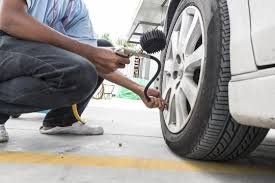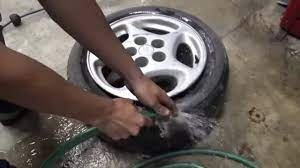In the domain of car care and interest, various inquiries emerge about elective arrangements and trials. One fascinating question that has aroused the curiosity of many car devotees is whether vehicle tires can be loaded up with water. While tires are customarily swelled with air, involving water as a substitute could sound enticing because of its overflow and simple entry. However, is this training practical, safe, and effective?
In this article, we will discuss Can You Fill Car Tires With Water? This early-on investigation sets out on an excursion to unwind the possible ramifications of filling vehicle tires with water. We will dive into the logical standards behind tire filling, looking at the basic factors, for example, tire construction, tension, and execution.
Moreover, we will investigate any potential benefits and disadvantages of water-filled tires contrasted with their air-filled partners. Through an exhaustive investigation, this conversation means to give clearness on whether water can genuinely be an elective vehicle for tire filling or on the other hand if it stays restricted to the domain of hypothesis and trial and error.
Thus, attach your safety belts, and we should leave on this intriguing undertaking to uncover the reality behind filling vehicle tires with water.
Contents
Can You Fill Car Tires With Water?
Keeping up with legitimate tire pressure is significant for a protected and productive driving experience. Certain individuals have puzzled over whether they can fill their vehicle tires with water as a substitute for air. We will investigate the possibility of filling vehicle tires with water, the potential dangers implied, and why it’s anything but a suggested practice.
The Idea of Water-Filled Tires
Involving water as a swap for air in vehicle tires depends on the understanding that water is an incompressible liquid, and subsequently, it can offer vital help in conveying the vehicle’s weight. While the facts confirm that water is incompressible, this property alone can’t make it a reasonable substitute for air in tires.
The Issues with Water-Filled Tires
- Weight: Water is essentially denser than air. Filling a tire with water can emphatically build its weight, overburdening the suspension framework and different parts. This extra weight can prompt decreased eco-friendliness and sped-up mileage on different pieces of the vehicle.
- Pressure: Water’s incompressibility turns into a significant downside when the vehicle is moving. At the point when a tire loaded up with air hits a knock or pothole, the packed air inside ingests the effect, giving a smoother ride. Conversely, water can’t pack, prompting a more brutal driving experience. This absence of padding could bring about harm to the actual tire and the vehicle’s general solidness.
- Taking care of and Security: Water-filled tires can prompt shaky dealing, particularly during turns and abrupt moves. The vehicle’s dealing qualities will be compromised, making it try to keep up with control on wet or elusive surfaces. This fundamentally builds the gamble of mishaps and risks the security of travelers and other street clients.
- Erosion: Water, being a destructive component, can harm the wheel edges and other metal parts inside the tire. After some time, this consumption can prompt underlying shortcomings, tire breaks, and even wheel disappointment.
- Difficulty: Filling tires with water is a relentless and illogical undertaking. How much water is required would be significant, and depleting it when essential would be a bulky interaction, making ordinary tire support a tedious issue.
The Correct Method for Keeping Up with Appropriate Tire Strain

Rather than turning to water-filled tires, you have to fill the air with a bicycle pump. Vehicle proprietors should stick to standard tire support rehearses:
- Normal Check-ups: Check tire tension something like one time each month and in a little while trips. Allude to the vehicle proprietor’s manual or the mark on the driver’s side door frame for the suggested tire pressure values.
- Swell with Air: Consistently utilize packed air to blow up tires. Corner stores and auto shops have air blowers furnished with pressure measures, making it simple to keep up with the right tire pressure.
- Stay away from Overinflation: Overinflated tires can be similarly pretty much as perilous as underinflated ones. Keep the prescribed strain rules to guarantee appropriate tire execution and life span.
- Screen Track Profundity: Routinely examine tire track profundity and supplant tires when they arrive at the base required profundity.
Can You Fill A Tire With Water?
You can’t fill a tire with water. Tires are intended to hold and contain air, not fluid. Endeavoring to fill a tire with water wouldn’t just be illogical but could likewise harm the tire, as enduring the weight and tension of water isn’t fabricated.
Why Tires Are Not Filled With Water?
Tires are not loaded up with water since water is incompressible, which would make the tire unbending and incapable of ingesting stuns or giving a smooth ride. Air, then again, is compressible, permitting tires to flex and give the important padding to an agreeable and safe driving experience.
Can Car Tires Float on Water?
Vehicle tires are not intended to drift on water. They are denser than water, so they sink when put in it. In any case, if a tire is enormous and empty, it could give a lightness because of the air caught inside, yet it won’t remain above water for a long time, making it unacceptable for buoyancy.
Conclusion
In outline, filling vehicle tires with water is not a practical or safe option in contrast to utilizing packed air. The idea ignores a few basic elements, including weight, pressure, dealing with, security, and consumption, which can prompt extreme ramifications for both the vehicle and its tenants.
Keeping up with legitimate tire pressure is a principal part of a capable vehicle proprietorship. Vehicle proprietors should comply with the maker’s rules and use air as the assigned mechanism for swelling tires. Thus, they guarantee ideal vehicle execution, better eco-friendliness, upgraded well-being, and broadened tire life, consequently giving a smoother and more charming driving experience.
Sources:
- By Naren Nagarajan Can vehicle tires be filled with water instead of air? Posted 6 Years Ago.


